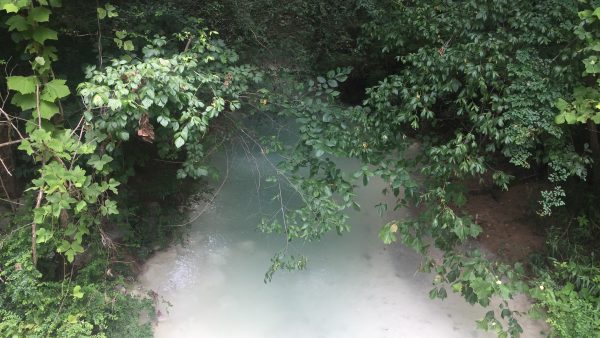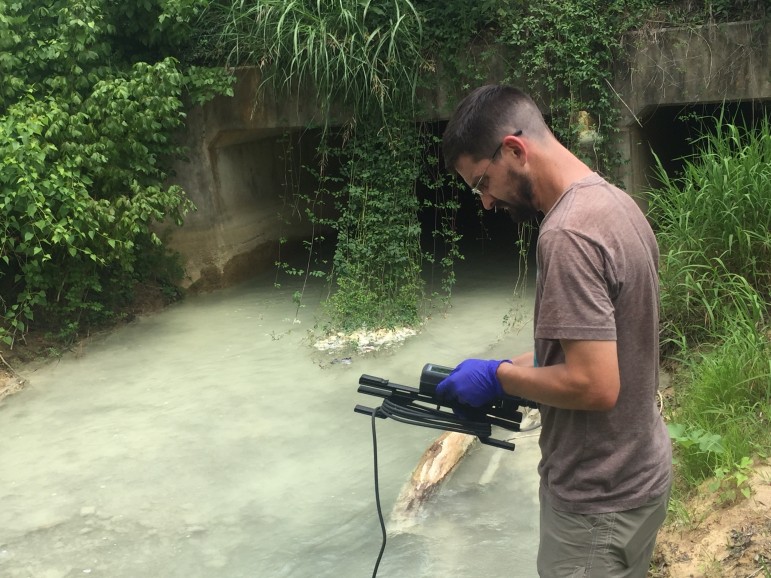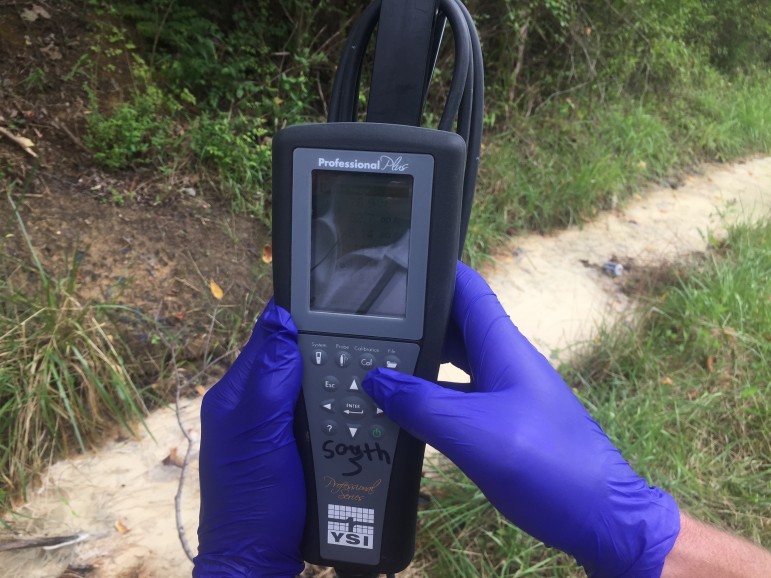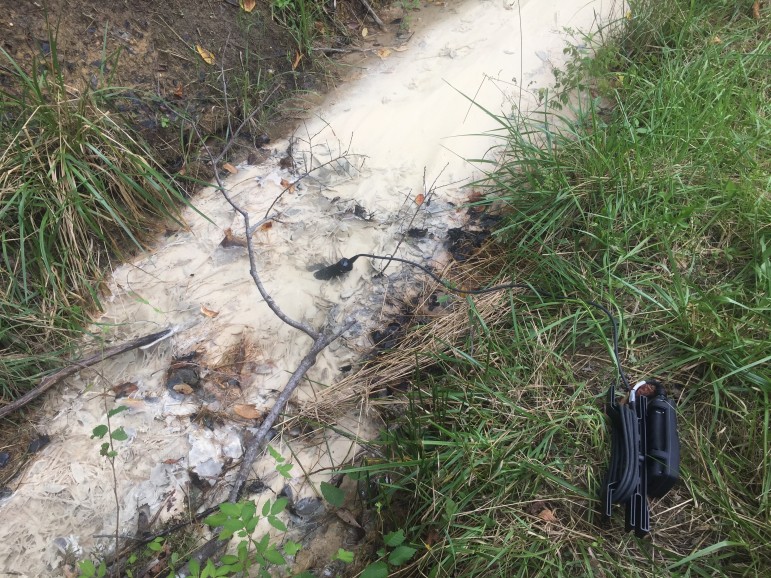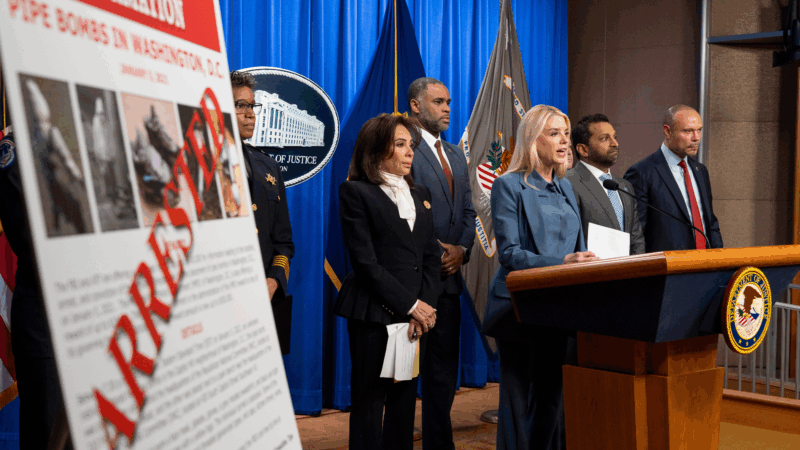Bleached Creek Highlights ADEM Shortfalls, Say Critics
Alabama has some of the most ecologically rich waters in the world. But the agency tasked with monitoring them gets less funding per capita than that of any other state, according to a study by the Environment Council of States. Some complain the Alabama Department of Environmental Management (ADEM) is not doing its job. One recent example that conservationists cite is Buck Creek in unincorporated Saginaw, near Alabaster, Alabama.
David Butler of Cahaba Riverkeeper, an environmental watchdog group, is there taking water samples and measurements. There’s a chemical smell, and the creek bed is almost white.
“I would challenge you to find anything living in the water here,” says Butler.
He’s been testing the creek, and so has ADEM. The pH levels have come back similar to those of household cleaning products, and there was no visible life downstream of the pollution’s source: a nearby Carmeuse Lime and Stone processing plant. It’s unclear when the contamination began, but Butler filed a complaint with ADEM 14 months ago.
“We discovered it last year in June,” he says. “There’s still no resolution to it. Even with this ongoing damage that you see here, the state found it appropriate to go ahead and issue a fine without really looking at the impact.”
Carmeuse is a billion-dollar multinational. ADEM fined the company $32,000.
For its part, Carmeuse has paid the fine, and a spokesman says in a written statement, “after becoming aware that uncontrolled drainage was occurring to Buck Creek, Carmeuse immediately began an investigation to identify the source of that drainage. Initially, an area of surface erosion from a waste lime storage area was identified as the likely source. Further investigations conducted by Carmeuse also identified several areas impacted by water infiltration along the embankment of a reclaimed quarry pit … [We] began a hydrogeologic investigation to understand the cause of the water infiltration.”
Butler thinks the fine ADEM imposed is too low.
“When you have a company that has the resources to fight the state, there’s just not going to be significant penalties,” he says. “It discourages the companies that do do the right thing from spending the extra money to make sure that they’re in compliance with the law. Because if you break the law, you get a slap on the wrist.”
An ADEM spokeswoman declined to discuss Buck Creek. She did point me to a recent report outlining the agency’s funding challenges. It warns of potential cuts to basic functions like monitoring, testing, and inspection.
“What do we expect?” asks Pat Byington, who was on the state commission that oversees the agency. “ADEM used to get funding at a level of about five to six million dollars a year. In the last couple years, it’s virtually been zero.”
Now the agency relies heavily on permit fees paid by businesses and on federal EPA dollars. But EPA money is unpredictable. ADEM has increased its permit fees to make up for some of the losses. Byington, though, worries that sets up a system where the companies being regulated financially support the regulators:
“They’ve been raising more and more monies on the people they’re supposed to be watching – they’re the ones paying the freight.”
After decades of working on environmental issues across the state, Byington is not optimistic about ADEM’s funding outlook. He says Buck Creek is just one recent example of why. But he’s not questioning motives at Alabama’s regulatory agency.
“The people at ADEM, I know, care about the environment,” he says. But, “One thing we all know is that ADEM is terribly underfunded. And it’s just like not having cops on the street.”
Environmental advocates want voters to demand more state funding for ADEM, so staff can do the work, and so there’s more accountability to taxpayers.
In the meantime, Buck Creek is still polluted, even as it flows through a popular wading spot on its way to the Cahaba River.
Pipe bomb suspect told FBI he targeted U.S. political parties, memo says
The man accused of placing two pipe bombs in Washington on the eve of Jan. 6, 2021 told investigators someone needed to "speak up" for people who believed the 2020 election was stolen, prosecutors said Sunday.
Chinese military stages drills around Taiwan to warn ‘external forces’
The drills came after Beijing expressed anger at U.S. arms sales, and a statement by Japan's prime minister saying its military could get involved if China were to take action against Taiwan.
Trump and Netanyahu to meet in Florida at a crucial moment for the Gaza ceasefire
President Trump could use the face-to-face at his Mar-a-Lago estate to look for ways to speed up the peace process, as Israel's leader has been accused of not pushing his side to move fast enough.
‘Bomb cyclone’ forecasted to bring heavy snow, blizzard conditions and dangerous travel
A 'bomb cyclone' is intensifying severe winter weather for millions of people across the U.S. The system is expected to knock out power and disrupt holiday travel.
Russia sends 3 Iranian satellites into orbit, report says
The report said that a Russian rocket sent the satellites on Sunday from a launchpad in eastern Russia.
Viral global TikToks: A twist on soccer, Tanzania’s Charlie Chaplin, hope in Gaza
TikToks are everywhere (well, except countries like Australia and India, where they've been banned.) We talk to the creators of some of the year's most popular reels from the Global South.

